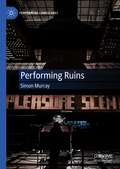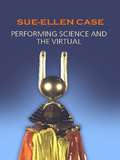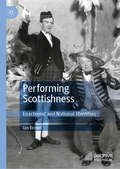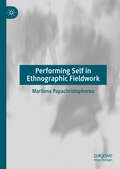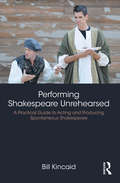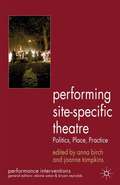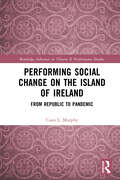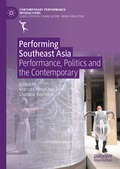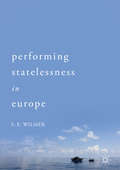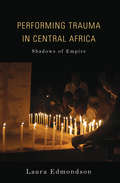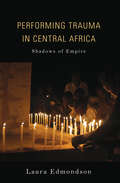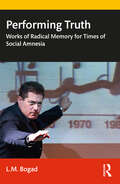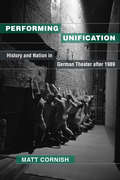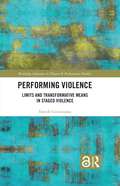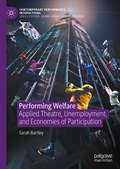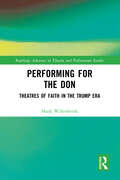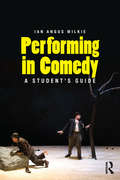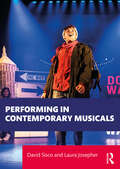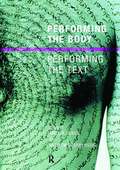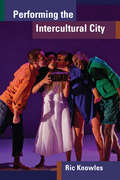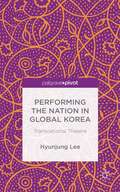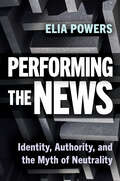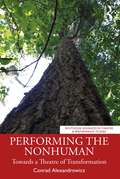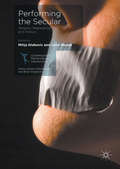- Table View
- List View
Performing Rites: On the Value of Popular Music
by Simon FrithWho's better? Billie Holiday or P. J. Harvey? Blur or Oasis? Dylan or Keats? And how many friendships have ridden on the answer? Such questions aren't merely the stuff of fanzines and idle talk; they inform our most passionate arguments, distill our most deeply held values, make meaning of our ever-changing culture. In Performing Rites, one of the most influential writers on popular music asks what we talk about when we talk about music. What's good, what's bad? What's high, what's low? Why do such distinctions matter? Instead of dismissing emotional response and personal taste as inaccessible to the academic critic, Simon Frith takes these forms of engagement as his subject--and discloses their place at the very center of the aesthetics that structure our culture and color our lives. Taking up hundreds of songs and writers, Frith insists on acts of evaluation of popular music as music. Ranging through and beyond the twentieth century, Performing Rites puts the Pet Shop Boys and Puccini, rhythm and lyric, voice and technology, into a dialogue about the undeniable impact of popular aesthetics on our lives. How we nod our heads or tap our feet, grin or grimace or flip the dial; how we determine what's sublime and what's "for real"--these are part of the way we construct our social identities, and an essential response to the performance of all music. Frith argues that listening itself is a performance, both social gesture and bodily response. From how they are made to how they are received, popular songs appear here as not only meriting aesthetic judgments but also demanding them, and shaping our understanding of what all music means.
Performing Ruins (Performing Landscapes)
by Simon MurrayThis book engages with the relationship between ruins, dilapidation, and abandonment and cultural events performed within such spaces. Following the author’s fieldwork in the UK, Bosnia Herzegovina, Poland, Germany, Greece, and Sicily, chapters describe, investigate, and reflect upon live performance events which have taken place in sites of decay and abandonment. The book’s main focus is upon modern economic ruins and ruins of warfare. Each chapter provides several case studies based upon the author’s own site visits and interviews with actors, directors, producers, curators, writers, and other artists. The book contextualises these events within the wider framework of Ruin Studies and provides brief summaries of how we might understand the ruin in terms of time, politics, culture, and atmospheres. The book is particularly preoccupied with artists’ reasons and motivations for placing performance events in ruined spaces and how these work dramaturgically.
Performing Science and the Virtual
by Sue-Ellen CaseThis impressive new book from Sue-Ellen Case looks at how science has been performed throughout history, tracing a line from nineteenth century alchemy to the twenty-first century virtual avatar. In this bold and wide-ranging book that is written using a crossbreed of styles, we encounter a glance of Edison in his laboratory, enter the soundscape of John Cage and raid tombs with Lara Croft. Case looks at the intersection of science and performance, the academic treatment of classical plays and internet-like bytes on contemporary issues and experiments where the array of performances include: electronic music Sun Ra, the jazz musician the recursive play of tape from Samuel Beckett to Pauline Oliveros Performing Science and the Virtual reviews how well these performances borrow from spiritualist notions of transcendence, as well as the social codes of race, gender and economic exchange. This book will appeal to academics and graduates studying theatre and performance studies, cultural studies and philosophy.
Performing Scottishness: Enactment and National Identities
by Ian BrownThis wide-ranging and ground-breaking book, especially relevant given Brexit and renewed Scottish independence campaigning, provides in-depth analysis of ways Scottishness has been performed and modified over the centuries. Alongside theatre, television, comedy, and film, it explores performativity in public events, Anglo-Scottish relations, language and literary practice, the Scottish diaspora and concepts of nation, borders and hybridity. Following discussion of the 1320 Declaration of Arbroath and the real meanings of the 1706/7 Treaty of Union, it examines the differing perceptions of what the ‘United Kingdom’ means to Scots and English. It contrasts the treatment of Shakespeare and Burns as ‘national bards’ and considers the implications of Scottish scholars’ invention of ‘English Literature’. It engages with Scotland’s language politics –rebutting claims of a ‘Gaelic Gestapo’ – and how borders within Scotland interact. It replaces myths about ‘tartan monsters’ with level-headed evidence before discussing in detail representations of Scottishness in domestic and international media.
Performing Self in Ethnographic Fieldwork
by Marilena PapachristophorouThis provocative book presents a methodological proposal for teaching ethnographic fieldwork, applying interdisciplinary tools inspired from performance theory, acting, experiential anthropology and existential psychotherapy. At the same time, it constitutes a theoretical and methodological trajectory mapping the history of ethnographic fieldwork through highly characteristic moments along with the author's own personal journey in the field in terms of a lifetime project. Starting from the assumption that ethnographic fieldwork constitutes a deeply human experience, the book proposes a step further towards the performative dimension of an ethnographic condition inspired by the Stanislavski method, which in practice complements performance theory issues: it is argued that participant observation offers an intermediate identity for the ethnographer through a conscious management of the social "role" dictated by their research participants; this ethnographic mediation of the Self may also have psychotherapeutic effects, mainly through conscious management of self-diversity and reflexivity in ethnographic writing. Ethnographic fieldwork is thus highlighted as a performative stage and a field of deep transformations for the ethnographer’s identity.
Performing Shakespeare Unrehearsed: A Practical Guide to Acting and Producing Spontaneous Shakespeare
by Bill KincaidPerforming Shakespeare Unrehearsed: A Practical Guide to Acting and Producing Spontaneous Shakespeare outlines how Shakespeare’s plays can be performed effectively without rehearsal, if all the actors understand a set of performance guidelines and put them into practice. Each chapter is devoted to a specific guideline, demonstrating through examples how it can be applied to pieces of text from Shakespeare’s First Folio, how it creates blocking and stage business, and how it enhances story clarity. Once the guidelines have been established, practical means of production are discussed, providing the reader with sufficient step-by-step instruction to prepare for Unrehearsed performances. This book is written for the actor and performer.
Performing Site-Specific Theatre
by Joanne Tompkins Anna BirchThis book investigates the expanding parameters for site-specific performance to account for the form's increasing popularity in the twenty-first century. Leading practitioners and theorists interrogate issues of performance and site to broaden our understanding of the role that place plays in performance and the ways that performance influences it
Performing Social Change on the Island of Ireland: From Republic to Pandemic (Routledge Advances in Theatre & Performance Studies)
by Ciara L. MurphyThis book examines the relationship between moments of significant social change on the island of Ireland and performance practice during the twentieth and twenty-first centuries. It examines how moments of significant change influence not only the content of performance practice but also the form and function of theatre production and reception. This book investigates how the Troubles and subsequent Peace Process, Second-Wave Feminism, the Celtic Tiger and neoliberalism, social revolution, and the COVID-19 pandemic impacts the form and function of performance practice across the island of Ireland. Although these forms of theatre and performance making refer to varied and distinct lineages of practice internationally, there are key parallels that compel a study of their inter-relationality in a specific Irish context This book explores how the performance of Ireland illuminates histories and stories that are on the margins, illuminating the lived realities of everyday life through the presentation of moments of violence, oppression, and trauma as something that is as important as the larger narratives often ascribed to nationhood. This book asks how performance practice engages with and informs moments of major social change on the island of Ireland through the distinct yet intersecting lenses of place, performance form, and social context over the course of almost a century of Irish theatre and performance practice.
Performing Southeast Asia: Performance, Politics and the Contemporary (Contemporary Performance InterActions)
by Marcus Cheng Chye Tan Charlene Rajendran"Performing Southeast Asia: Performance, Politics and the Contemporary is an important reconsideration of the histories and practices of theatre and performance in a fluid and dynamic region that is also experiencing an overarching politics of complexity, precarity and populist authoritarian tendencies. In a substantial introductory essay and essays by leading scholars, activists and practitioners working inside the region, the book explores fundamental questions for the arts. The book asks how theatre contributes to and/or addresses the political condition in the contemporary moment, how does it represent the complexity of experiences in peoples’ daily lives and how does theatre engage in forms of political activism and enable a diversity of voices to flourish. The book shows how, in an age of increasingly violent politics, political institutions become sites for bad actors and propaganda. Forces of biopolitics, neo-liberalism and religious and ethnic nationalism intersect in unpredictable ways with decolonial practices – all of which the book argues are forces that define the contemporary moment. Indeed, by putting the focus on contemporary politics in the region alongside the diversity of practices in contemporary theatre, we see a substantial reformation of the idea of the contemporary moment, not as a cosmopolitan and elite artistic practice but as a multivalent agent of change in both aesthetic and political terms. With its focus on community activism and the creative possibilities of the performing arts the region, Performing Southeast Asia, is a timely intervention that brings us to a new understanding of how contemporary Southeast Asia has become a site of contest, struggle and reinvention of the relations between the arts and society." - Peter Eckersall, The Graduate Center, City University of New York, USA "Performing Southeast Asia – with chapters concerned with how regional theatres seek contextually-grounded, yet post-national(istic) forms; how history and tradition shape but do not hold down contemporary theatre; and how, in the editors’ words, such artistic encounters could result in theatres ‘that do not merely attend to matters of cultural heritage, tradition or history, but instead engage overtly with theatre and performance in the contemporary’ – contributes to the possibility of understanding what options for an artistically transubstantiated now-ness may be: to the possibility, that is, of what might be called a ‘Present-Tense Theatre’." - C. J. W.-L. Wee, Professor of English, Nanyang Technological University, SingaporeThis book examines contemporary performance practices and politics in Southeast Asia. It analyses performances created and performed in Southeast Asia, with specific focus on particular nation states, as these engage the volatile or shifting cultures and politics that inform contemporary life, particularly in urban Southeast Asia. In a region haunted historically by political divergence, authoritarianism and militarism, religious diversity and ethnic strife, the chapters reveal how contemporary performance, and performances today reflect yet challenge dominant socio-political discourses. The authors centre their discussion on the efficacies of performance as political intervention in Southeast Asia in a time of seismic socio-political change. They consider issues of state hegemonies, censorship, the resurgence of authoritarianism, the persistence of history and tradition, the impact of finance and sponsorship, social liberalism and conservatism and globalisation and cultural practice.
Performing Statelessness in Europe
by S. E. WilmerThis book examines performative strategies that contest nationalist prejudices in representing the conditions of refugees, the stateless and the dispossessed. In the light of the European Union failing to find a political solution to the current migration crisis, it considers a variety of artistic works that have challenged the deficiencies in governmental and transnational practices, as well as innovative efforts by migrants and their hosts to imagine and build a new future. It discusses a diverse range of performative strategies, moving from a consideration of recent adaptations of Greek tragedy, to performances employing fictive identification, documentary dramas, immersive theatre, over-identification and subversive identification, nomadism and political activism. This study will appeal to those interested in questions of statelessness, migration, and the problematic role of the nation-state.
Performing Trauma in Central Africa: Shadows of Empire (African Expressive Cultures)
by Laura EdmondsonWhat are the stakes of performance in a time of war? How is artistic expression prone to manipulation by the state and international humanitarian organizations? From the standpoint of empire, Laura Edmondson explores cultural production that responds to the 1994 genocide in Rwanda, the twenty-year civil war in northern Uganda, and regional conflict in the eastern part of the Democratic Republic of the Congo. She examines memorial ceremonies, plays, indigenous performance, NGO media campaigns, and contemporary dance to reveal how artists and cultural workers challenge state and humanitarian narratives in the shadow of empire and how empire, in turn, infiltrates creative capacities. Carefully contextualizing these narratives within the charged political terrain of the Great Lakes Region, Edmondson deepens our understanding of the role of creative expression and cultural agency in conflict and postconflict zones.
Performing Trauma in Central Africa: Shadows of Empire (African Expressive Cultures)
by Laura Edmondson“An outstanding addition to the literature on theatre and performance in situations of conflict and post-conflict.” —New Theatre QuarterlyWhat are the stakes of cultural production in a time of war? How is artistic expression prone to manipulation by the state and international humanitarian organizations? In the charged political terrain of post-genocide Rwanda, post-civil war Uganda, and recent violence in the Democratic Republic of Congo, Laura Edmondson explores performance through the lens of empire.Instead of celebrating theatre productions as expression of cultural agency and resilience, Edmondson traces their humanitarian imperatives to a place where global narratives of violence take precedence over local traditions and audiences. Working at the intersection of performance and trauma, Edmondson reveals how artists and cultural workers manipulate narratives in the shadow of empire and how empire, in turn, infiltrates creative capacities.
Performing Truth: Works of Radical Memory for Times of Social Amnesia
by L.M. BogadPerforming Truth answers the most pressing questions facing any theatre-makers who are wrestling with how to present historical, political or socioeconomic information in an engaging, entertaining, and galvanizing way. How to make data compelling and documents mobilizing? How to keep an audience interested in what might be dry, dire, or depressing? How to surprise an audience and keep them alert? Collecting together the performance texts of international performance artist and activist L.M. Bogad, this book accompanies each script with essays that further explore that work's performance strategies. It also equips readers with specific resources and pedagogical tools to help those wishing to stage these pieces or create their own work to engage with similar topics. Bogad also provides "takeaways" for each piece, illustrating the challenges of its particular subject matter and how to overcome those challenges with innovations unique to performance art. This is a key guidebook for artists and theatre-makers facing the challenges of engaging with information in an era of fake news, propaganda bots, and the polarization of ideological spheres, as well as students and teachers taking on that challenge in theatre studies, performance studies and performing arts classrooms.
Performing Unification: History and Nation in German Theater after 1989
by Matt CornishSince the moment after the fall of the Berlin Wall in 1989, the most important German theater artists have created plays and productions about unification. Some have challenged how German history is written, while others opposed the very act of storytelling. Performing Unification examines how German directors, playwrights, and theater groups including Heiner Müller, Frank Castorf, and Rimini Protokoll have represented and misrepresented the past, confronting their nation’s history and collective identity. While scholars and critics have scrutinized unification in cinema and literature, this is the first book to focus on theater and performance. Author Matt Cornish surveys German-language history plays from the Baroque period through Friedrich Schiller, Heinrich von Kleist, Brecht, and up to the documentary theater movement of the 1960s to show how German identity has always been contested, even well before Germany became a nation. Then turning to performances of unification after 1989, Cornish argues that theater, in its structures and its live gestures, on pages, stages, and streets, helps us to understand the past and its effect on us, our relationships with others in our communities, and our futures. Engaging with theater theory from Aristotle through Bertolt Brecht and Hans-Thies Lehmann’s “postdramatic” theater, and also with theories of history from Hegel to Walter Benjamin and Hayden White, Performing Unification demonstrates that historiography and dramaturgy are intertwined.
Performing Violence: Limits and Transformative Means in Staged Violence (Routledge Advances in Theatre & Performance Studies)
by Davide GiovanzanaThis book offers an exhaustive approach to all forms of staged violence and an in-depth analysis of their emergence and repercussions (dramaturgically and physically).This study explores instruments to surpass the dichotomic opposition victim-oppressor, to demystify the spell of violence, and to get rid of the morbid voyeurism often connected to staged violence, and eventually, it proposes transformative tools to explore empowering experiences through violence. Considering all the aspects of a theatre performance engaging with staged violence (the story displaying violence, the actors’ embodiment of violence, the spectators’ experiences of being exposed to violence, and the process of performing violence), this book proposes analytical and practical tools to explore the limit and to transform the experience of performing violence.This book will be of great interest to students and scholars in theatre and performance studies.
Performing Welfare: Applied Theatre, Unemployment, and Economies of Participation (Contemporary Performance InterActions)
by Sarah BartleyThis book explores what happens to socially committed performance when state systems of social security are dismantled. Since 2010, a punishing programme of economic austerity and a seismic overhaul of the Welfare State in the United Kingdom has been accompanied by an ideological assault on dependency; a pervasive scapegoating of the poor, young, and disabled; and an intensification of the discursive relationship between morality and work. This book considers the artistic, material, and ideological consequences of such shifts for applied and socially engaged performance. Performing Welfare reveals how such arts practices might reconstitute notions of work and labour in socially constructive ways. It focuses on the political potential of participation during a period in which classifications of labour and productivity are intensely contested. It examines the migration of discourses from state policy to the cultural sector; narratives of community and aesthetics of dependency; the paradoxes of visibility in creative projects with stigmatised participants; the implicit relationship of participatory performance to neoliberal productivity; and, the parallels between gendered divisions of labour, social reproduction, and applied performance. It will appeal to students, scholars, and practitioners interested in applied and socially engaged performance, participation, community, representation, the welfare state, social policy, labour, and unemployment.
Performing for the Don: Theaters of Faith in the Trump Era (Routledge Advances in Theatre & Performance Studies)
by Hank WillenbrinkThis volume examines the intersection of political power and religion during the presidency of Donald Trump through an examination of performance. This study begins with an examination of white evangelical Christian support for Trump through readings of the 2018 film The Trump Prophecy, based on a book of the same name, and The Faith of Donald J. Trump, a "spiritual biography" of the former president by veteran Christian reporters David Brody and Scott Lamb. White evangelicals Christianized Trump during his run for office in 2016 and Trump’s ascension to the presidency broke down barriers between church and state in service of dominionistic Christian aims. This exploration then looks at the conservative Catholicism through an exploration of Heroes of the Fourth Turning, a finalist for the 2019 Pulitzer Prize for Drama by Will Arbery, and Rod Dreher’s The Benedict Option. While Trump’s connection to evangelicals is well documented, conservative Catholics like Attorney General Bill Barr and Supreme Court Justice Amy Coney Barrett took on pivotal roles during the Trump administration demonstrating the significance of conservative Catholicism to his presidency. The author finally examines the "cult" of Trump on the internet by interrogating the performance of spirituality in pro-Trump conspiracy theories like QAnon. This book will be of great interest not only to theatre and performance studies scholars but also scholars with interests in political and religious studies.
Performing in Comedy: A Student's Guide
by Ian WilkieIan Wilkie contends that comic acting is a distinct art form, and as such demands a unique skillset. By exploring the ways in which performance choices and improvised moments can work in conjunction with texts themselves, Performing in Comedy offers an indispensable practical tool for enhancing comic performance. This volume is a must-read for any actors, directors or students who work with comic texts. Wilkie synthesises theories and principles of comedy with practical tips, and re-evaluates the ways in which these ideas can be used by the performer. Most importantly, these skills – timing, focus, awareness – are teachable rather than being innate talents. Exercises, interviews and guides to further resources enhance this comprehensive exploration of comic acting.
Performing in Contemporary Musicals
by David Sisco Laura JosepherPerforming in Contemporary Musicals brings into sharp focus the skills performers must possess when tackling shows that are newly written, in development, or somewhere in between. The authors bust myths about contemporary musical theatre and analyze the development timelines of musicals from around the world. They also explore how performers can become invaluable to a creative team by developing the skills needed to move a new musical forward including: contemporary acting and singing techniques, dramaturgy, quickly picking up new material, and collaboration. Each chapter features insightful industry interviews, recommended activities, an extensive reading list, and an online companion for further study. This textbook is the only comprehensive resource that provides an overview of the development process of a new musical while guiding musical theatre performers to be fruitful collaborators in a new works scenario.
Performing the Body/Performing the Text
by Amelia Jones Andrew StephensonThis book explores the new performativity in art theory and practice, examining ways of rethinking interpretive processes in visual culture. Since the 1960s, visual art practices - from body art to minimalism - have taken contemporary art outside the museum and gallery; by embracing theatricality and performance and exploding the boundaries set by traditional art criticism. The contributors argue that interpretation needs to be recognised as much more dynamic and contingent. Offering its own performance script, and embracing both canonical fine artists such as Manet, De Kooning and Jasper Johns, and performance artists such as Vito Acconci and Gunter Brus, this book offers radical re-readings of art works and points confidently towards new models for understanding art.
Performing the Intercultural City
by Ric KnowlesIn 1971, Canada became the first country to adopt an official policy of multiculturalism. Performing the Intercultural City explores how Toronto—a representative global city in this multicultural country—stages diversity through its many intercultural theater companies and troupes. The book begins with a theoretical introduction to theatrical interculturalism. Subsequent chapters outline the historical and political context within which intercultural performance takes place; examine the ways in which Indigenous, Filipino, and Afro-Caribbean Canadian theater has developed play structures based on culturally specific forms of expression; and explore the ways that intercultural companies have used intermediality, modernist form, and intercultural discourse to mediate across cultures. Performing the Intercultural City will appeal to scholars, artists, and the theater-going public, including those in theater and performance studies, urban studies, critical multiculturalism studies, diaspora studies, critical cosmopolitanism studies, critical race theory, and cultural studies.
Performing the Nation in Global Korea: Transnational Theatre
by Hyunjung LeeThis book illustrates how local awareness of Western cultural hegemonic entities such as Broadway and Shakespeare have been implemented within South Korean theatre in the global era. With a focus on performances that targeted global audiences, Lee explores the ways in which Korea's nationalistic desires for global visibility are projected on stage.
Performing the News: Identity, Authority, and the Myth of Neutrality
by Elia PowersPerforming the News: Identity, Authority, and the Myth of Neutrality explores how journalists from historically marginalized groups have long felt pressure to conform when performing for audiences. Many speak with a flat, “neutral” accent, modify their delivery to hide distinctive vocal attributes, dress conventionally to appeal to the “average” viewer, and maintain a consistent appearance to avoid unwanted attention. Their aim is what author Elia Powers refers to as performance neutrality—presentation that is deemed unobjectionable, reveals little about journalists’ social identity, and supposedly does not detract from their message. Increasingly, journalists are challenging restrictive, purportedly neutral forms of self-presentation. This book argues that performance neutrality is a myth that reinforces the status quo, limits on-air diversity, and hinders efforts to make newsrooms more inclusive. Through in-depth interviews with journalists in broadcasting and podcasting, and those who shape their performance, the author suggests ways to make journalism more inclusive and representative of diverse audiences.
Performing the Nonhuman: Towards a Theatre of Transformation (ISSN)
by Conrad AlexandrowiczThis book radically reimagines theatre/performance pedagogy and dramaturgy in response to the accelerating climate crisis.This text is founded upon the principle that the theatre is the most anthropocentric of all the arts: the means of its representation, the human figure, is identical with its conventional object, the human narrative, broadly considered. In order to respond ethically to the climate crisis, it must expand its range to include performing as/in response to the nonhuman. Conrad Alexandrowicz concisely explores theoretical approaches to the other‑than‑human, found in the work of, among others, Jane Bennett, Timothy Morton, Rosi Braidotti, and Cary Wolfe. The implications of this move are far‑reaching and commence with displacing realism from its traditional position of dominance. The practices of 20th century physical theatre visionaries such as Tadeusz Kantor, Jacques Lecoq, and Jerzy Grotowski are revisited and reconsidered for their applicability to forms of theatre that might serve the needs of establishing storytelling deriving from nonhuman phenomena. This logically leads to the matter of responding appropriately to Indigenous ways of knowing and being. The work finds guidance in Indigenous, pre‑scientific ways of knowing and being, such as those articulated by Robin Wall Kimmerer (Braiding Sweetgrass, 2013). In contemplating our kinship with vegetative life, the work finds inspiration in the latest research into the ways tree communities communicate, collaborate, and share resources, including the work of Suzanne Simard (Finding the Mother Tree, 2021). It next imagines transformations in how theatre is situated, delivered, and received and considers the ways in which the performer/spectator binary may have to be reconfigured, with particular reference to Grotowski’s experiments in participatory theatre. It poses an even more provocative question: is such theorized performance work pointing in the direction of some re‑imagined version of ritual and ceremony that may find antecedents in pre‑Christian European belief and practice? Finally, it locates such eco‑theatre in the realm of healing: climate anxiety, depression, and grief on the part of instructors, students, and artists will require us to consider and activate the healing power of the art form; perhaps, the core purpose of all the arts will shift to support the need to generate solace in times of fear, anger, and uncertainty.This book is intended for instructors, both scholars and performance pedagogues, in theatre and performance studies, as well as graduate and undergraduate students in these areas.
Performing the Secular
by Jisha Menon Milija GluhovicThis book is a timely anthology which aims to unsettle our habituated modes of thinking about the place of the secular in cultural productions. The last decade alone has witnessed many religious protests against cultural productions, which have led, in some cases, to the closure of theatre and opera performances. Threats to artists led to the exile of Indian painter, MF Husain, and murder of Dutch film-maker Theo van Gogh, the controversy over the depiction of the Islamic prophet Muhammad in the Danish newspaper Jyllands-Posten in 2005 led to the cancellation of performances of Mozart's Idomeneo for the season. Offering fresh and provocative readings that probe the limits and promise of secularity in relation to questions of performance, politics, and the public sphere, this book will be invaluable to scholars who seek to understand the dramatic rise of politicized theology in our new century.

